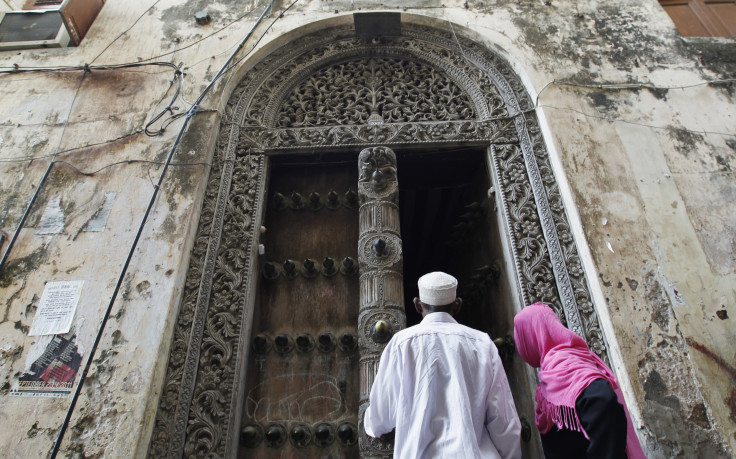Murder In Zanzibar: Christians, Muslims Struggle To Keep The Peace In Tourist Hotspot

A Catholic priest on the picturesque East African archipelago of Zanzibar was shot dead on Sunday, raising concerns about the threat of religiously motivated violence in Tanzania, one of Africa’s most stable countries.
Father Evarist Mushi was on his way to lead a service at the Betras Catholic Church in Mtoni -- an area not far from Stone Town, a World Heritage Site -- when assailants cornered and killed him. The incident echoes a similar attack in December, when attackers shot and seriously wounded another Catholic priest in the Tomondo area to the south of Stone Town.
Mushi’s death spurred condemnation from security officials on the island, who urged calm and vowed to apprehend the perpetrators.
“We understand that these crimes are being propped up by some bad elements under the pretext of politics, religion or economic reasons, though no religion or political grouping supports violence in principle,” said Said Mwema, the Tanzanian inspector general of police, according to the Tanzania Daily News.
Despite these assurances, the death of Father Mushi is sure to unsettle Zanzibar’s Christians, who are vastly outnumbered on the archipelago. Tanzania as a whole is 60 percent Christian and 36 percent Muslim. But in Zanzibar, more than 95 percent of residents follow Islam.
Religion is integral to Tanzanian society; a full 95 percent of both Christians and Muslims said that faith was a very important part of their lives, according to data from a comprehensive 2010 poll conducted by the The Pew Forum. Of Tanzania’s Muslims, 86 percent said the Quran should be taken literally; 78 percent of Christians said the same of the Bible.
A division between the country’s two largest religious groups is evident. Though the survey found that 95 percent of both groups said religiously motivated violence could not be justified, a majority of Muslims said they knew little or nothing about Christianity, just as the majority of Christians said they knew little or nothing about Islam.
Zanzibar, home to about 1.2 million people, is composed of two main islands -- Unguja and Pemba -- and myriad smaller ones. About two-thirds of the archipelago’s population lives on the main island of Unguja, which is about 30 miles from the beaches of Dar es Salaam, Tanzania’s largest city and commercial hub.
Zanzibar was ruled by a sultanate based in Oman for centuries, and Arabs maintained a strong presence on the archipelago even after it became a British protectorate in the late 1800s. But shortly after Zanzibar gained its independence in 1963, black Africans overthrew the Arab monarchy in a bloody revolution.
Zanzibar formally joined its neighboring mainland nation -- the former German and British colony of Tanganyika -- in 1964 to become the modern state of Tanzania.
The country implemented a multiparty democratic system in 1992 and has enjoyed relative stability since then, but tensions between the mainland and the semi-autonomous Zanzibar archipelago have always been an issue.
The conflict has taken on political dimensions. Tanzania’s most powerful party, the Chama cha Mapinduzi or CCM, is championed by most residents of the mainland; a rival group called the Civil United Front, or CUF, is favored by most people in Zanzibar. CUF national election losses in 2000 and 2005 prompted violent protests on the archipelago.
The discord is exacerbated by Tanzania’s reliance on tourism. Zanzibar, famed for its mix of Arab and African cultures, is a prime vacation spot for Westerners. Luxury hotels and trendy bars are situated just miles away from scenes of endemic poverty, and this jarring juxtaposition has helped to spur extremist sentiment.
The threat of terrorist violence in Zanzibar has grown in recent years with the rise of a group called the Association for Islamic Mobilization and Propagation, also known as Uamsho, which means “awakening” in Swahili. Though founded in 2001 as a charitable organization, Uamsho has evolved to become a strong critic of tourists’ perceived excesses on the archipelago, as well as an advocate for Zanzibar secession.
Alhaj Juma Salum, a chief sheikh in Dar es Salaam, warned police that the assailants who killed Mushi might have been linked to Uamsho activists, according to The Citizen, a Tanzania newspaper.
So while the specter of violence on the idyllic archipelago is nothing new, the recent deaths are bringing long-simmering issues into the spotlight. That’s bad news for the Tanzanian economy, which depends on tourism to generate about 17 percent of GDP annually.
Tanzania is one of the poorest countries on earth, with GDP per capita of about $1,700. Subsistence agriculture is a way of life for most citizens.
Macroeconomic success in the country is still encouraging -- the World Bank forecasts 7 percent growth annually, in keeping with the trajectory of the past few years -- but those revenues have yet to make a big difference for Tanzanians in rural areas where poverty is rife, who make up the vast majority of the population.
© Copyright IBTimes 2024. All rights reserved.






















